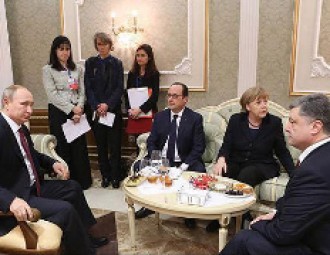Negotiations of the Normandy four in Minsk have lasted for over five hours

For now negotiations of the leaders of Russia, Ukraine, France, and Germany are continuing but the number of participants has been reduced.
The "Normandy four" leaders have started talks on the Ukraine settlement in Minsk on February 11. Russian President Vladimir Putin, Ukrainian President Petro Poroshenko and French President Francois Hollande and German Chancellor Angela Merkel have gathered at the Independence Palace in Minsk for their meeting.
Almost 500 journalists had gathered to cover the summit. They could see the "Normandy four" leaders arrive at the Independence Palace where they were met and greeted by the host - Belarusan President Aliaksandr Lukashenka, ITAR-TASS reports.
The leaders did not make any statements before the meeting.
In the evening of February 11, in Minsk, Trilateral Contact Group (Ukraine - Russia - OSCE), which met on Wednesday reconvened in Diplomatic Hall in Minsk. It discussed a draft protocol of the settlement of the situation in Donbas, BelTA reports. The meeting was attended by representatives of the self-proclaimed PRD and PRL
The summit may signal a culmination of the intense multilateral efforts to tap clues to resolution of the crisis in south-eastern Ukraine.
According to Uladzimir Makei, the Belarusan Foreign Minister, “the negotiations have secured progress, but for the moment it is difficult to say when the negotiations are going to end”.
Let us recall that diplomatic efforts on the Ukrainian issue picked pace over the past seven days, as Angela Merkel and Francois Hollande visited Kiev and Moscow where they made public their proposals on how to settle the Ukrainian problem.
On Sunday, the Normandy Four discussed the most recent developments over the phone and appointed a meeting in Minsk for Tuesday.
In the brief interval between the meetings in Moscow and Minsk, Merkel visited Washington for talks with Barack Obama. She said after the meeting that one more attempt to settle the conflict in Ukraine should be made, adding that she would have never pardoned herself if this attempt had not been made.
Hollande told reporters before departure for Minsk he was leaving with a firm conviction a much-desired compromise solution would be found eventually.
Poroshenko said before boarding the jet in Kiev was going to Minsk to cease fire and open a political dialogue immediately and unconditionally.
-
03.01
-
07.10
-
22.09
-
17.08
-
12.08
-
30.09








































